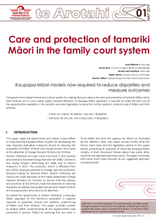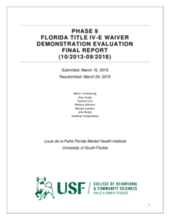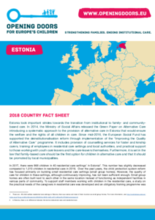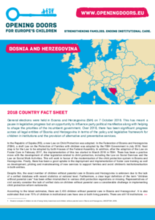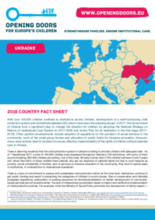Displaying 351 - 360 of 1025
This paper presents the current vulnerabilities faced by children and the scenario of child protection in India. While discussing the legal provisions prevailing in the country, it sheds light on the socio-cultural barriers that are creating resistance within the society in making the Alternative Care model (and the process of deinstitutionalisation of children) a success. Lastly it suggests viable options that may be helpful for the same.
The aim of this study is to compare the subjective well-being (SWB) of children hosted in institutions and in foster families with the well-being of children living with their families. Results indicate that children in residential care have a lower SWB in all variables compared to foster care and general populations groups.
This paper urges the government and nation of New Zealand to give effect to long-standing Kaupapa Māori models for developing the new required evaluation measures aimed at reducing the disparities for Māori children and young persons who come to the attention of Oranga Tamariki Ministry for Children.
In this chapter from the book Re-Visioning Public Health Approaches for Protecting Children, the authors critically examine the practical and organisational issues as well as the ideational and procedural ones that challenge policy makers, leaders and those delivering services as they attempt to re-focus child protection service delivery toward earlier intervention and prevention within a public health framework.
This chapter from the book Re-Visioning Public Health Approaches for Protecting Children, drawing on recent international empirical research, illustrates the perspectives of key stakeholders in the child welfare and protection services: Children, caregivers and practitioners. It shows that while there is an awareness of what children and families require in order to lead supported and healthy lives, the current system is challenged in its attempts to adequately address their needs due to its forensic and highly regulated orientation.
This report presents findings from an implementation analysis aimed at describing implementation of the U.S. state of Florida Title IV-E Demonstration Project, which allowed the state to use certain federal funds more flexibly, for services other than room and board expenses for children served in out-of-home care.
This factsheet highlights the developments and challenges still ahead in Estonia and offers key recommendations to the EU and the national government to ensure that children are cared for in family-based settings.
This factsheet highlights the developments and challenges still ahead in Bosnia and Herzegovina and offers key recommendations to the EU and the national government to ensure that children are cared for in family-based settings.
The Opening Doors for Europe’s Children – a pan-European campaign that advocates for strengthening families and ending institutional care – released 16 country fact sheets about the progress with the transition from institutional to family- and community-based care (also known as deinstitutionalisation) in 2018.
This factsheet highlights the developments and challenges still ahead in Ukraine and offers key recommendations to the EU and the national government to ensure that children are cared for in family-based settings.

